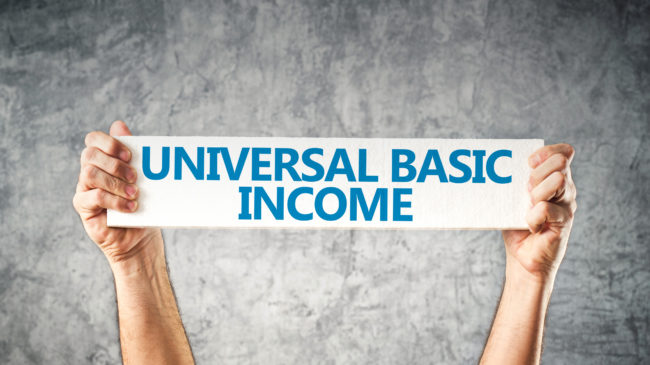With presidential candidate Andrew Yang suspending his campaign before making it to California’s Super Tuesday primary, other candidates are moving to appeal to his small but devoted “Yang Gang” fanbase by talking about his proposed “freedom dividend,” which promised every adult American $1,000 a month.
“I’ll continue to carry this torch of Universal Basic Income that will re-invigorate our middle class and those struggling just to make ends meet, bridge the income gap and unleash an era of entrepreneurship and productivity,” Rep. Tulsi Gabbard tweeted on Feb. 12.
Universal basic income (UBI), an issue particularly popular in Silicon Valley, was Yang’s signature issue. But the need for UBI is questionable — not even Democratic Socialist Sen. Bernie Sanders is currently advocating for it — and its adverse impacts could be substantial.
In 2019, Tesla and Space X founder Elon Musk tweeted “I support Yang” and said UBI is “needed” as artificial intelligence and robots threaten millions of jobs. But when it comes to the prospect of self-driving cars displacing human Uber and Lyft drivers, Musk’s prognostications have come up short. In January 2017, he tweeted that Teslas would have full self-driving capability in three-to-six months. Three years later, we’re still waiting.
It turns out that Silicon Valley’s hype over driverless cars overlooked the many complexities of the real world. While it’s easy for an autonomous vehicle to negotiate a test track without pedestrians on a sunny day, the urban driving environment introduces many complexities that are difficult to overcome.
There will be a need for humans behind the wheel and in many other jobs we’re told are disappearing. Similarly, there will be increased demand for human workers in other areas, like health care workers and home aides to look after our aging population and for technicians to install and maintain green energy infrastructure.
With a 3.5 percent national unemployment rate and the US economy adding 100,000 or more jobs monthly, fears of an imminent technology-driven employment meltdown are overblown. Thus, in today’s economy, universal basic income is a solution in search of a problem.
If and when new technologies destroy jobs, other industries may well create new opportunities. Just as the industrial revolution simultaneously eliminated agricultural jobs and created factory jobs, future economic transformations may well create new occupations we have yet to imagine. If not, there will be plenty of time to reconsider UBI when we start seeing a significant uptick in long-term, rather than cyclical, unemployment.
It is best to wait and watch how these changes unfold because any form of UBI, Yang’s included, would have negative side-effects. “The total cost of providing $12,000 per year to all 236 million adult citizens is $2.8 trillion,” the Universal Basic Income Center notes.
That money would have to come from somewhere.
To Yang’s credit, he does not rely on Modern Monetary Theorist’s preferred approach of paying for new entitlements with freshly printed money – risking a return to inflation. Instead, he aims to help pay for his universal basic income program with a value-added tax (VAT). While Yang’s logic is semi-fiscally sound, the choice of a regressive tax is perplexing. With this financing mechanism, middle-income individuals who spend most of their income could end up subsidizing affluent UBI recipients.
That’s because under Yang’s, and most other UBI plans, the monthly checks would go to everyone—Elon Musk and Mark Zuckerberg included. Undoubtedly, many millionaires and billionaires won’t deposit their remittances or would donate them to charity, but why waste taxpayers’ resources generating these unnecessary payments? And while Yang contends that a 10 percent VAT would fully cover his freedom dividend, the Tax Foundation estimates that a 22 percent VAT would be required. And that would be additive to state and local sales taxes, which are already approaching 10 percent in many parts of California.
With the national and state unemployment rates under four percent, a $1,000 monthly universal basic income would dampen work incentives at a time when employers need more workers to put in more hours. Yang and Musk have generated many promising ideas, but they’re off-base on the immediate need for a universal basic income.
This column originally appeared in the Orange County Register.

